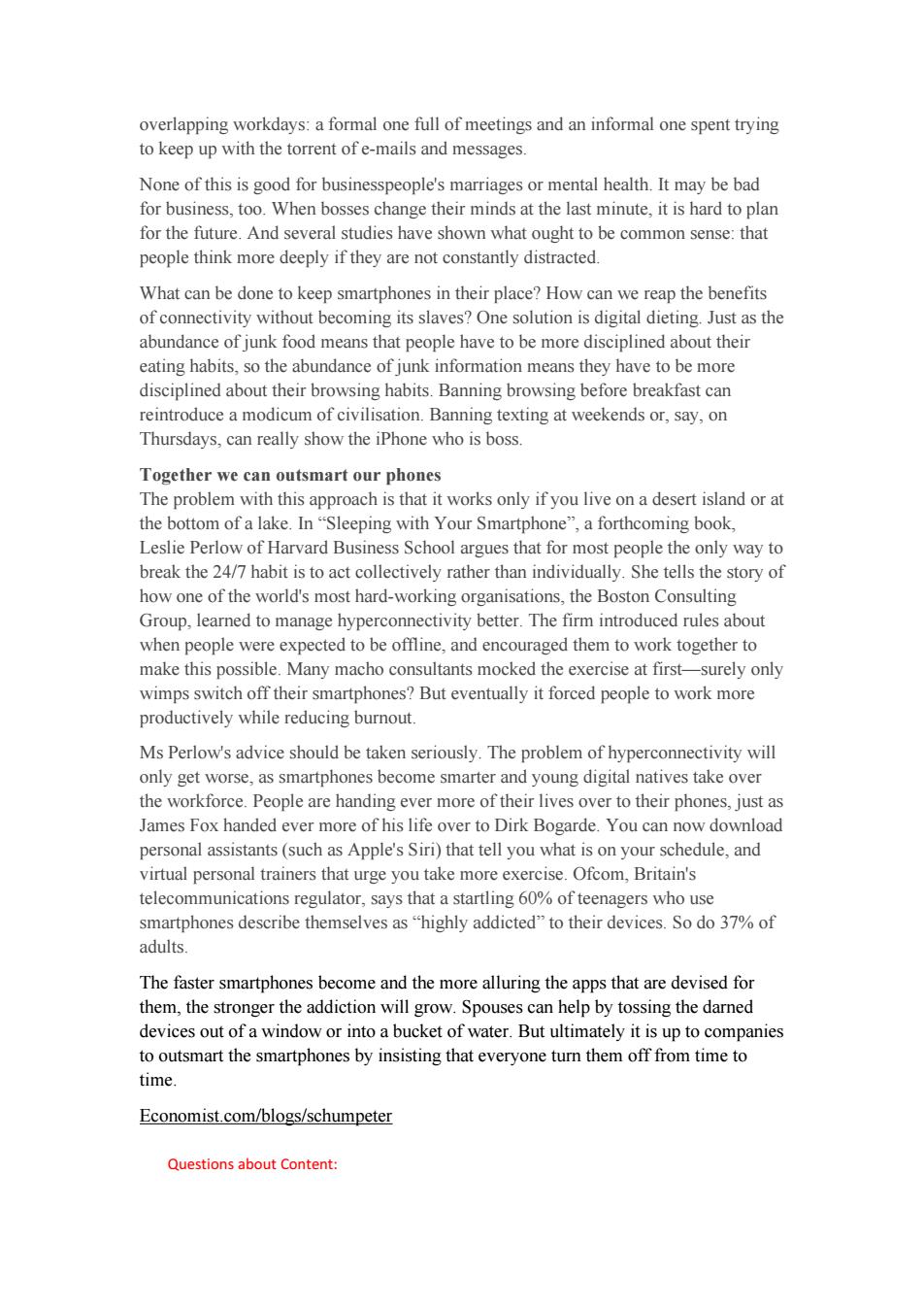正在加载图片...

overlapping workdays:a formal one full of meetings and an informal one spent trying to keep up with the torrent of e-mails and messages None of this is good for businesspeople's marriages or mental health.It may be bad for business,too.When bosses change their minds at the last minute,it is hard to plan for the future.And several studies have shown what ought to be common sense:that people think more deeply if they are not constantly distracted What can be done to keep smartphones in their place?How can we reap the benefits of connectivity without becoming its slaves?One solution is digital dieting.Just as the abundance of junk food means that people have to be more disciplined about their eating habits,so the abundance of junk information means they have to be more disciplined about their browsing habits.Banning browsing before breakfast can reintroduce a modicum of civilisation.Banning texting at weekends or,say,on Thursdays,can really show the iPhone who is boss. Together we can outsmart our phones The problem with this approach is that it works only if you live on a desert island or at the bottom of a lake.In "Sleeping with Your Smartphone",a forthcoming book, Leslie Perlow of Harvard Business School argues that for most people the only way to break the 24/7 habit is to act collectively rather than individually.She tells the story of how one of the world's most hard-working organisations,the Boston Consulting Group,learned to manage hyperconnectivity better.The firm introduced rules about when people were expected to be offline,and encouraged them to work together to make this possible.Many macho consultants mocked the exercise at first-surely only wimps switch off their smartphones?But eventually it forced people to work more productively while reducing burnout. Ms Perlow's advice should be taken seriously.The problem of hyperconnectivity will only get worse,as smartphones become smarter and young digital natives take over the workforce.People are handing ever more of their lives over to their phones,just as James Fox handed ever more of his life over to Dirk Bogarde.You can now download personal assistants(such as Apple's Siri)that tell you what is on your schedule,and virtual personal trainers that urge you take more exercise.Ofcom,Britain's telecommunications regulator,says that a startling 60%of teenagers who use smartphones describe themselves as"highly addicted"to their devices.So do 37%of adults. The faster smartphones become and the more alluring the apps that are devised for them,the stronger the addiction will grow.Spouses can help by tossing the darned devices out of a window or into a bucket of water.But ultimately it is up to companies to outsmart the smartphones by insisting that everyone turn them off from time to time. Economist.com/blogs/schumpeter Questions about Content:overlapping workdays: a formal one full of meetings and an informal one spent trying to keep up with the torrent of e-mails and messages. None of this is good for businesspeople's marriages or mental health. It may be bad for business, too. When bosses change their minds at the last minute, it is hard to plan for the future. And several studies have shown what ought to be common sense: that people think more deeply if they are not constantly distracted. What can be done to keep smartphones in their place? How can we reap the benefits of connectivity without becoming its slaves? One solution is digital dieting. Just as the abundance of junk food means that people have to be more disciplined about their eating habits, so the abundance of junk information means they have to be more disciplined about their browsing habits. Banning browsing before breakfast can reintroduce a modicum of civilisation. Banning texting at weekends or, say, on Thursdays, can really show the iPhone who is boss. Together we can outsmart our phones The problem with this approach is that it works only if you live on a desert island or at the bottom of a lake. In “Sleeping with Your Smartphone”, a forthcoming book, Leslie Perlow of Harvard Business School argues that for most people the only way to break the 24/7 habit is to act collectively rather than individually. She tells the story of how one of the world's most hard-working organisations, the Boston Consulting Group, learned to manage hyperconnectivity better. The firm introduced rules about when people were expected to be offline, and encouraged them to work together to make this possible. Many macho consultants mocked the exercise at first—surely only wimps switch off their smartphones? But eventually it forced people to work more productively while reducing burnout. Ms Perlow's advice should be taken seriously. The problem of hyperconnectivity will only get worse, as smartphones become smarter and young digital natives take over the workforce. People are handing ever more of their lives over to their phones, just as James Fox handed ever more of his life over to Dirk Bogarde. You can now download personal assistants (such as Apple's Siri) that tell you what is on your schedule, and virtual personal trainers that urge you take more exercise. Ofcom, Britain's telecommunications regulator, says that a startling 60% of teenagers who use smartphones describe themselves as “highly addicted” to their devices. So do 37% of adults. The faster smartphones become and the more alluring the apps that are devised for them, the stronger the addiction will grow. Spouses can help by tossing the darned devices out of a window or into a bucket of water. But ultimately it is up to companies to outsmart the smartphones by insisting that everyone turn them off from time to time. Economist.com/blogs/schumpeter Questions about Content: